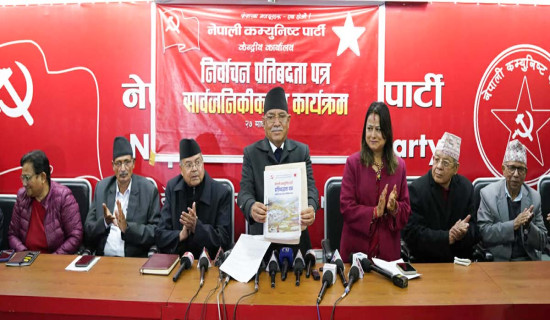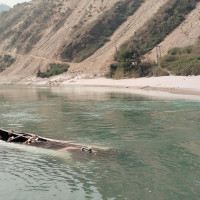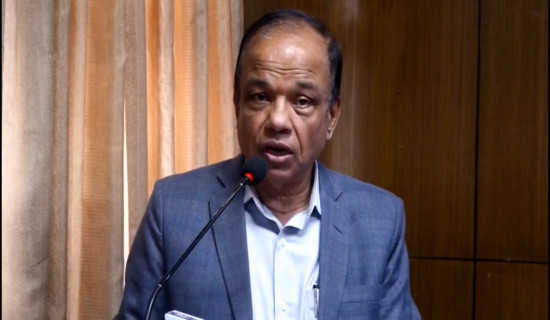- Wednesday, 11 February 2026
Will Bill Meddlers Face State Action?
The tussle between the bureaucracy and political domain has once again come to the fore, with the tampering of the ‘cooling-off period’ provision in the Federal Civil Service Bill that is under discussion in the National Assembly. The Bill that has been indispensable to restructure the civil service under the new federal set-up has now fallen into controversy owing to the legislative fraudulence. The insertion of a new clause that nullifies the provision to bar civil servants from getting appointed to constitutional, diplomatic and political positions for two years after their retirement or resignation has triggered accusations and counter-accusations among the lawmakers and political leaders.
A parliamentary special probe committee has held the State Affairs and Good Governance Committee chairman Ramhari Khatiwada, its secretary Suraj Kumar Dura and Chief Secretary Ek Narayan Aryal, among other senior bureaucrats, politically and morally responsible for the Bill manipulation. The committee involving the cross-party lawmakers took four weeks to prepare the report amidst heated debates and discord among them. The representatives of CPN-Maoist Centre, Rastriya Prajatantra Party and Rastriya Swatantra Party have claimed that lawmakers of major parties resorted to emotional blackmail to produce the report that suited the latter’s vested interests.
The ruling party MPs were against the idea of using the term ‘morality’ in the report and finally agreed to insert it following persistent pressure from the smaller parties. This implies that the committee failed to investigate the matter seriously and deeply, for it could not name the person (s) who inserted the word ‘except’ that reverses the entire spirit of the cooling-off period provision.
Procedural lapses
Nonetheless, the committee has pointed out serious procedural lapses on the part of committee members. Its chairman did not convene the meeting to conduct clause-by-clause discussions on the amended final draft, particularly Sub-clauses 4 and 5 under Clause 82. The insertion of Sub-clause (4) is consistent with the two-year cooling-off period provision unanimously approved by the Committee but it does not align with Sub-clause (5) that mentions the cooling-off period applies to civil servants to get appointments in areas except for constitutional, diplomatic and government-nominated positions.
The Bill lay open to all 275 lawmakers in the House of Representatives (HoR) for 15 days to peruse and review it, but they were unaware of the manipulation of its specific provision, which exposed their inertia and lackadaisical attitude. It is undoubtedly a collective failure of the entire House to uphold legislative integrity. As the Committee chair Khatiwada put his signature on the final draft of the Bill, he has been under mounting pressure to resign from the post on moral grounds. Interestingly, he is passing the buck to all members of the committee and lawmakers of the House, stating that they were also equally responsible for this blunder.
The report also pointed the finger at Dura for he had a defined legal role in organising the meeting, preparing the draft bill, certifying the content and submitting the draft to the meetings. Some media reports disclosed his double role – on one hand, he was a part of the committee’s decision on introducing the provision of the cooling-off period and on the other, he joined top bureaucrats, including the Chief Secretary, to lobby against the very provision. Committee chair Khatiwada showed no qualms when Dura sought permission to band together with the senior bureaucrats to remove the cooling-off period provision.
The report has generated questions about the professional conduct of Chief Secretary Aryal, who led a campaign to quash the Clause of the cooling-off period. They met the Prime Minister, the Speaker, the opposition leader and the Nepali Congress president for the purpose. His public stand against the cooling-off period was unbecoming of the Chief Secretary, as this challenged the rights of parliamentary committees acquired and exercised through the popular mandate, according to the report. His misconduct contradicted his own defined responsibilities. The government agencies and officials are bound to honour and implement the decisions of the legislature and its committees. This is one of the rare cases in which the Chief Secretary was found culpable for legislative tampering that rocked the political spectrum. It is yet to be seen how the government takes disciplinary action against him and other officials.
The investigation committee has offered 11-point recommendations to make the lawmaking process transparent and qualitative, requiring the lawmakers to discuss the bills minutely and responsibly. It has been suggested to integrate and study the main Bill and the report of the relevant House committee, allow access only to certain levels of officials in the ministry during clause-wise discussions of the Bill, while holding the Bill presenter, the minister, more accountable. It has called for developing a system in which the committee chair loudly reads out the amendments to the bills before all members, makes them in the minute book, and puts the signatures of members on the decisions.
Capacity building
Similarly, the final report of the committee should be compulsorily discussed in its meeting before sending it to the House, the functions, duties and rights of the committee secretary should be mentioned in the House Regulations and conduct a regular capacity building programme for the lawmakers about the legislative process and policy impacts and legal structure. The fate of the Federal Civil Service Bill still hangs in the balance as five UML lawmakers have registered a collective amendment proposal to scrap the mandatory cooling-off period for the top bureaucrats. On the other hand, two Nepali Congress lawmakers have presented a proposal to restore the cooling-off period provision.
The Legislative Committee of the Assembly will have a final say on whether or not to remove the cooling-off period from the Bill. It is believed that the NA will correct the Bill in line with the report of the State Affairs and Good Governance Committee and send it to the Lower House for approval. If the UML stands against the cooling-off period provision, the passage of the Bill will be uncertain, raising questions regarding the competency and integrity of the law-making body and lawmakers as well.
(The author is Deputy Executive Editor of this daily.)





-square-thumb.jpg)


-square-thumb.jpg)








